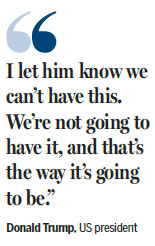Trump tries tougher tone on Russia amid criticism
Aides move to limit damage after 'meddling' controversy
US President Donald Trump continued to court controversy on Wednesday over alleged Russian meddling in the US election, while his aides were kept busy with damage control.
Trump drew fierce criticism on Monday during a news conference alongside Russian President Vladimir Putin in Helsinki when he appeared to contradict United States intelligence services by saying he saw no reason why Russia would have targeted the 2016 US election.
On Wednesday, Trump was confronted at the start of a White House Cabinet meeting by a reporter, who asked: "Is Russia still targeting the US, Mr President?"

"Thank you very much. No," Trump replied.
He then said that no president has been tougher on Russia than he has. "I think (Russian) President (Vladimir) Putin knows that better than anybody, certainly a lot better than the media," he said.
Just two hours later, White House press secretary Sarah Sanders explained to reporters that her boss was saying "no" to whether he would take further questions - not to whether he thinks Russia continues to target the US.
"I had a chance to speak with the president after his comments, and the president was - said, 'Thank you very much', and was saying 'no' to answering questions," Sanders said.
In a CBS Evening News interview aired on Wednesday, Trump said he had warned Putin in their one-on-one meeting that the US will not tolerate any further interference by Russia.
"I let him know we can't have this. We're not going to have it, and that's the way it's going to be," Trump said.
When asked whether he holds Putin responsible, Trump replied: "Well, I would, because he's in charge of the country, just like I consider myself to be responsible for things that happen in this country."
Trump set off a major firestorm at home when he was asked at the Monday news conference with Putin about Russian election meddling.
Trump told reporters that "I have President Putin, he just said it's not Russia. I will say this: I don't see any reason why it would be".
The words came three days after the US Justice Department announced the indictments of 12 Russian intelligence officers for hacking into Democratic Party National Committee emails.
Strong backlash
Under the strong backlash from both parties, Trump said on Tuesday he misspoke at the summit. "The sentence should have been, 'I don't see any reason why I wouldn't, or why it wouldn't be Russia" instead of "why it would'," he said.
"One of the most unsurprising aspects of the outcome of Helsinki is President Trump's seeming alignment with Putin on most matters, not the least being their mutual and often-expressed conviction that the US is responsible for the state of the US-Russia relationship," John Allen, president of the Brookings Institution, wrote on the think tank's website on Wednesday.
While many in the US are curious about what Trump and Putin discussed during their two-hour-long meeting, at which only their interpreters were present, Anatoly Antonov, the Russian ambassador to the US, told reporters in Moscow on Wednesday that the two leaders had achieved "important verbal agreements", including preservation of the major bilateral arms control treaties - New Start and INF agreements.
Antonov said that Putin had made "specific and interesting proposals to Washington" on how the two countries could cooperate on Syria.
Agnia Grigas, a nonresident senior fellow at the Atlantic Council's Eurasia Center, said it is important to not get caught up in the theatrics of the news conference.
"Indeed, what wasn't said at the news conference is potentially more important than what was said," he wrote on the institute's website on Wednesday.
The Washington Post contributed to the story.
chenweihua@chinadaily.com.cn
(China Daily 07/20/2018 page12)














